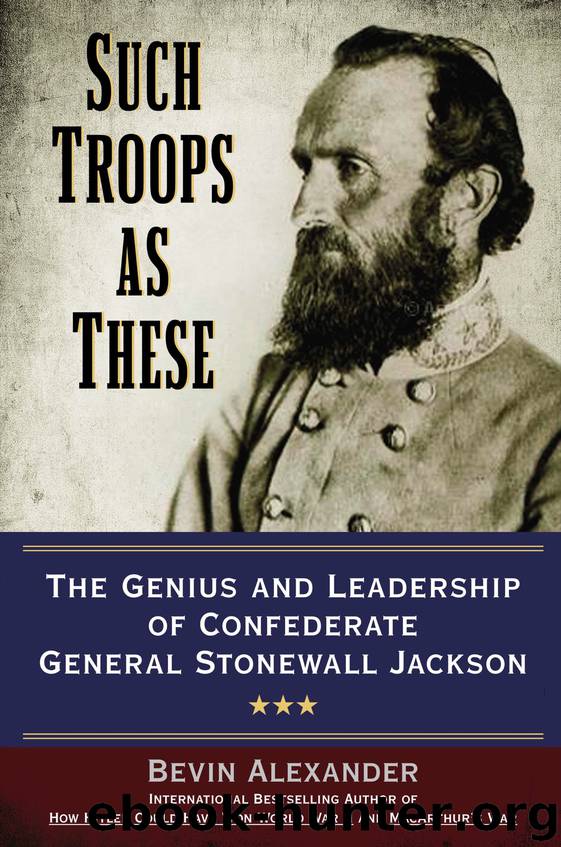Such Troops as These by Bevin Alexander

Author:Bevin Alexander
Language: eng
Format: epub
Publisher: Penguin Publishing Group
Published: 2014-07-28T16:00:00+00:00
CHAPTER 8
Calamity in Maryland
Robert E. Lee had gone into the summer campaign of 1862 intending only to maneuver John Pope out of Virginia. He had been forced into a battle at Second Manassas by Stonewall Jackson. Even then, he refused to draw in Longstreet’s corps until the very end of two days of dreadful, solitary defense against the Union army endured entirely by Jackson. Because of this, Lee had turned the total victory that Jackson had prepared for into a modest battlefield advantage, and the vast bulk of the Federal army was able to pull away to safety.
Now Lee decided to invade Maryland, but he intended to follow the same nonaggressive policy of avoiding battle there. He got President Davis’s authorization by saying that, once the Southern army had established itself on Northern soil, the Confederate government should propose peace based on recognition of Southern independence. Lee did not intend to inflict any damage on the Northern economy, but the fact that the Southern army was in a position where it might inflict injury, would, in Lee’s eyes, “prove to the country [the North] that the responsibility for continuance of the war does not rest upon us, but that the party in power in the United States elect to prosecute it for purposes of their own.”1
There was no indication that the mere presence of a Confederate army in the North would set off a groundswell of opposition to the war. Also, relying on others to accomplish one’s own goals is an unreliable and generally unproductive policy. Furthermore, Abraham Lincoln and the Radical Republicans in Congress were determined to put down what they called the “rebellion,” and Lincoln was moving to proclaim an end of slavery in the seceded states. Lincoln was waiting for a Northern victory to announce this publicly. This would turn the war into a crusade, and would eliminate practically all organized opposition to the war. Intimations of this plan were already rife, because the astute South Carolinian Mary Chesnut wrote about it in her diary on July 8, 1862.2 All of this should have been plain to Robert E. Lee. But it wasn’t.
The Northern war policy was precisely the opposite of the pacific persuasion that Lee was proposing. The North was invading the South along every available avenue, and was inflicting the utmost damage on everything within reach. John Pope had threatened to treat mothers as traitors if they wrote their sons in the Confederate army. The Federal government had seized Lee’s 1,100-acre estate at Arlington, and Union troops had absconded with the furniture and displayed in New York relics of George Washington stolen from the mansion. They had even demolished the Winchester home of James M. Mason, the Confederate representative to Britain.3
The North had imposed an iron blockade on all Southern ports, virtually cutting off trade with Europe except by a few blockade runners. Since the South possessed only one-eleventh the industry of the North, it could not produce anywhere close to the amount of war goods required.
Download
This site does not store any files on its server. We only index and link to content provided by other sites. Please contact the content providers to delete copyright contents if any and email us, we'll remove relevant links or contents immediately.
| American Revolution | Civil War |
| US Presidents |
Fanny Burney by Claire Harman(26603)
Empire of the Sikhs by Patwant Singh(23086)
Out of India by Michael Foss(16853)
Leonardo da Vinci by Walter Isaacson(13336)
Small Great Things by Jodi Picoult(7142)
The Six Wives Of Henry VIII (WOMEN IN HISTORY) by Fraser Antonia(5515)
The Wind in My Hair by Masih Alinejad(5095)
A Higher Loyalty: Truth, Lies, and Leadership by James Comey(4964)
The Crown by Robert Lacey(4817)
The Lonely City by Olivia Laing(4802)
Millionaire: The Philanderer, Gambler, and Duelist Who Invented Modern Finance by Janet Gleeson(4478)
The Iron Duke by The Iron Duke(4356)
Papillon (English) by Henri Charrière(4274)
Sticky Fingers by Joe Hagan(4198)
Joan of Arc by Mary Gordon(4110)
Alive: The Story of the Andes Survivors by Piers Paul Read(4033)
Stalin by Stephen Kotkin(3966)
Aleister Crowley: The Biography by Tobias Churton(3640)
Ants Among Elephants by Sujatha Gidla(3467)
